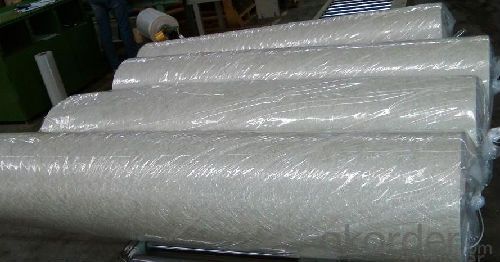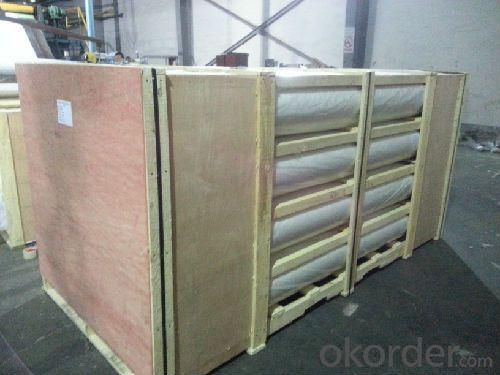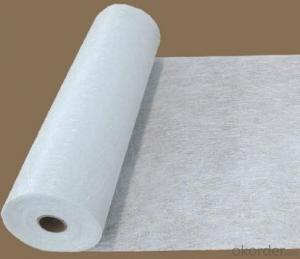E Glass Fiber Chopped Strand Mat for FRP Panel
- Loading Port:
- Shanghai
- Payment Terms:
- TT OR LC
- Min Order Qty:
- 4000 kg
- Supply Capability:
- 200000 kg/month
OKorder Service Pledge
OKorder Financial Service
You Might Also Like
Introduction of E-glass Chopped Strand Mat
Chopped strand mat is made from fiberglass chopped strands boned with powder binder or emulsion binder.
E glass chopped strand mat is made from fiberglass strands chopped to length and bonded together with powder binder.Chopped strand mat is used primarily for hand lay-up processes, filament winding and press molding of FRP products. Typical products include bathroom accessories, pipe, building materials, automobiles, furniture and other FRP products.
This products ischaracterized bg good combination of resin,easg operation ,good wet strengthretention,good laminate transparency
Chopped strand mat is used primarily for hand lay-up processes, filament winding and press molding of FRP products. Typical products include bathroom
accessories, pipe, building materials, automobiles, furniture and other FRP products.
Features of E-glass Chopped Strand Mat
1.Warp and weft rovings aligned in a parallel,flat manner and uniform tension .
2.Densely alighed fibers,providing high dimensional stability ans easy handing .
3.Good moldability,fast and complete resin wet-out ,enabling high productively .
4.Good transporsision and hign strength of the composite products.
5.Even thickness ,no fuzz ,no stain.
6.Fast wet-out ,products with high strength ,little loss for strength in damp situation.
Features of E-glass Chopped Strand Mat
1.the composit products have high dry and wet tensile strenth and good transparency.
2.Low fuzz ,dirt ,impurity and other stain
Images of E-glass Chopped Strand Mat


E-Glass Chopped Strand Mat Specification:
Property | Glass type | Weight(g/m2) | Width 200~3300 | Roll Weight | Moisture Content /% | Combustible Content /% | Breakage Strength /N |
Test Method | GB/T 1549 | ISO3374:2000 | ISO3374 | GB/T17470-1998 | ISO3344:1997 | ISO1887:1995 | ISO3342 |
EMC 80 | E-GLASS | 80±16 | ±5 | 6~50 | <0.2 | 13.6±0.35 | ≥200 |
EMC 100 | E-GLASS | 100±10 | ±5 | 6~65 | <0.2 | 9.5±0.35 | ≥170 |
EMC 150 | E-GLASS | 150±15 | ±5 | 6~97 | <0.2 | 8.0±0.35 | ≥40 |
EMC 225 | E-GLASS | 225±22 | ±5 | 6~150 | <0.2 | 5.0±0.6 | ≥60 |
EMC 300 | E-GLASS | 300±30 | ±5 | 6~180 | <0.2 | 4.0±0.6 | ≥90 |
EMC 450 | E-GLASS | 450±45 | ±5 | 6~180 | <0.2 | 3.8±0.6 | ≥120 |
EMC 600 | E-GLASS | 600±60 | ±5 | 6~240 | <0.2 | 3.6±0.6 | ≥150 |
EMC 900 | E-GLASS | 900±90 | ±5 | 6~190 | <0.2 | 3.4±0.6 | ≥180 |
FAQ of Chopped strand mat
1. Why Choose us?
CNBM is a stated own company, provide the guarantee for the best quality, best service and safety business.
2. How will we guarantee the quality?
a, ISO 9001-2008 quality control system;
b, Strict and regular quality control in production;
c, Inspeciation when loading into container before shippment;
d, Sample stock for one year for quality tracing and record.
3. What is your MOQ?
Our MOQ is one pallet.
4. Can you provide sample?
Yes, samples are in stock. we can offer free sample for you.
5. Payment terms?
We can accept L/C, T/T etc.
6. Do you offer OEM service?
Yes, we can print customers’ logo on the packaging;
And the size and specification can be produced and design according to your demand.
- Q:What are the different types of resins compatible with fiberglass mat tissue?
- There are several different types of resins that are compatible with fiberglass mat tissue. These resins include polyester resin, epoxy resin, vinyl ester resin, and polyurethane resin. Polyester resin is one of the most commonly used resins in fiberglass mat applications. It is cost-effective and has good mechanical properties, making it suitable for a wide range of applications. Polyester resin is also easy to work with and provides good resistance to water and chemicals. Epoxy resin is another popular choice for fiberglass mat tissue. It offers excellent mechanical properties, high strength, and good resistance to chemicals and moisture. Epoxy resin is often used in applications that require superior strength and durability, such as aerospace and marine industries. Vinyl ester resin is a hybrid between polyester and epoxy resins. It combines the best properties of both resins, offering high strength, good corrosion resistance, and excellent durability. Vinyl ester resin is commonly used in applications where high chemical resistance and superior mechanical properties are required. Polyurethane resin is a versatile resin that can be used with fiberglass mat tissue. It offers excellent flexibility, impact resistance, and adhesion properties. Polyurethane resin is often used in applications that require high flexibility and resistance to abrasion, such as automotive parts and sporting goods. Overall, the choice of resin depends on the specific requirements of the application, including mechanical properties, chemical resistance, flexibility, and cost.
- Q:Can fiberglass mat tissue be used for architectural sculptures?
- Yes, fiberglass mat tissue can be used for architectural sculptures. Fiberglass mat tissue is a versatile material that is commonly used in various applications, including architectural sculptures. It is lightweight, flexible, and has excellent strength and durability properties, making it suitable for creating intricate and detailed sculptures. The fiberglass mat tissue can be molded and shaped into various forms, allowing artists and sculptors to bring their creative visions to life. It can be used to create sculptures of different sizes and shapes, whether it is a small decorative piece or a large-scale installation. Additionally, fiberglass mat tissue is resistant to weather and environmental conditions, making it suitable for outdoor sculptures that are exposed to harsh elements. It can withstand extreme temperature changes, UV radiation, and moisture, ensuring that the sculptures remain intact and visually appealing for a long time. Furthermore, the material can be easily painted and finished to achieve the desired aesthetic appearance. It can be coated with different types of paints, varnishes, or finishes to enhance the visual appeal and protect the surface of the sculpture from potential damage. Overall, fiberglass mat tissue provides artists and sculptors with a reliable and versatile medium for creating architectural sculptures. Its strength, durability, and adaptability make it an excellent choice for bringing artistic visions to life in the architectural realm.
- Q:Is fiberglass mat tissue suitable for railway rolling stock?
- Yes, fiberglass mat tissue is suitable for railway rolling stock. Fiberglass mat tissue is a lightweight and durable material that is commonly used in the construction industry for various applications, including in the manufacturing of railway rolling stock. It offers excellent mechanical strength and resistance to corrosion, making it ideal for use in the harsh and demanding environments that railway rolling stock typically operates in. Additionally, fiberglass mat tissue has good thermal insulation properties, which can help to improve the energy efficiency of the rolling stock. Overall, fiberglass mat tissue is a suitable and reliable choice for the construction and maintenance of railway rolling stock.
- Q:What is the flexural strength of fiberglass mat tissue?
- The flexural strength of fiberglass mat tissue refers to its ability to resist bending or flexing without breaking. It is typically high due to the reinforcing properties of the fiberglass material, making it suitable for applications requiring structural integrity and resistance to deformation.
- Q:What is the chemical resistance of fiberglass mat tissue?
- Fiberglass mat tissue has excellent chemical resistance due to its composition, which includes a high percentage of glass fibers. These fibers provide a barrier against various chemicals, making the fiberglass mat tissue highly resistant to corrosion and degradation when exposed to acids, alkalis, solvents, and other harsh chemicals.
- Q:Is fiberglass mat tissue resistant to chemicals?
- Generally, fiberglass mat tissue is resistant to chemicals. Its composition, comprising fine glass fibers bonded together with a resin, grants it exceptional chemical resistance properties. This resistance enables the fiberglass mat tissue to endure exposure to various chemicals without deteriorating or compromising its structural integrity. Nevertheless, it is crucial to acknowledge that the precise chemical resistance of fiberglass mat tissue may differ based on the type and concentration of the chemical it encounters. Therefore, it is advisable to consult the manufacturer's guidelines or perform suitable testing to ensure compatibility with particular chemicals.
- Q:Can fiberglass mat tissue be used for making lightweight automotive parts?
- Yes, fiberglass mat tissue can be used for making lightweight automotive parts.
- Q:Does fiberglass mat tissue provide any UV resistance?
- Yes, fiberglass mat tissue typically provides some level of UV resistance. The fiberglass mat tissue is made up of glass fibers that are embedded in a matrix of resin. These fibers and resin provide some degree of protection against UV radiation from the sun. However, it is important to note that the level of UV resistance may vary depending on the specific composition and manufacturing process of the fiberglass mat tissue. Additionally, prolonged exposure to UV radiation can still cause some degradation over time, so it is recommended to take appropriate measures such as using UV-resistant coatings or finishes to enhance the durability and lifespan of the fiberglass mat tissue in outdoor applications.
- Q:Can fiberglass mat tissue be used for wind turbine blades?
- Yes, fiberglass mat tissue can be used for wind turbine blades. Fiberglass mat tissue is a lightweight and strong material that is commonly used in the construction of wind turbine blades. It provides excellent strength-to-weight ratio and is resistant to corrosion, making it ideal for withstanding the harsh environmental conditions that wind turbine blades are exposed to. Additionally, fiberglass mat tissue can be easily molded into complex shapes, allowing for the creation of aerodynamically efficient wind turbine blades. Overall, the use of fiberglass mat tissue in wind turbine blades helps to improve their performance and durability.
- Q:Can fiberglass mat tissue be used for flooring insulation?
- Typically, fiberglass mat tissue is not employed for flooring insulation. It is a lightweight substance frequently utilized in the construction sector to reinforce plaster and concrete, and as insulation in walls and ceilings. However, for flooring insulation purposes, other materials like foam boards or batt insulation are generally favored. These materials offer superior thermal and sound insulation features that are specifically tailored for flooring applications. Moreover, they are simpler to install and better equipped to endure the pressures and demands of foot traffic on the flooring.
1. Manufacturer Overview |
|
|---|---|
| Location | |
| Year Established | |
| Annual Output Value | |
| Main Markets | |
| Company Certifications | |
2. Manufacturer Certificates |
|
|---|---|
| a) Certification Name | |
| Range | |
| Reference | |
| Validity Period | |
3. Manufacturer Capability |
|
|---|---|
| a)Trade Capacity | |
| Nearest Port | |
| Export Percentage | |
| No.of Employees in Trade Department | |
| Language Spoken: | |
| b)Factory Information | |
| Factory Size: | |
| No. of Production Lines | |
| Contract Manufacturing | |
| Product Price Range | |
Send your message to us
E Glass Fiber Chopped Strand Mat for FRP Panel
- Loading Port:
- Shanghai
- Payment Terms:
- TT OR LC
- Min Order Qty:
- 4000 kg
- Supply Capability:
- 200000 kg/month
OKorder Service Pledge
OKorder Financial Service
Similar products
New products
Hot products
Related keywords



























